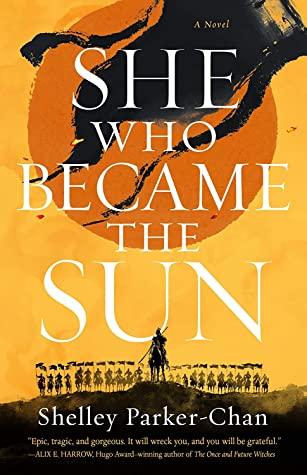I finished this book with mixed feelings, though I do recommend it, and it’s getting well-deserved rave reviews. I love a novel that tells a historical story in a new way, especially a history I know little about. In this debut novel, Shelley Parker-Chan tells the story of the beginnings of the Ming Dynasty, after their revolt against the Mongols in 1345. Parker-Chan tells the story of the first emperor of the Ming Dynasty, but turns her into a woman. This book is described as “Mulan meets The Song of Achilles“. I loved the rich detail of this story, which is vividly told with interesting characters.
The story begins with Zhu Chongba, a peasant girl who is starving with her father and brother. The village seer prophesies greatness for Zhu’s brother, but sees nothing for Zhu’s fate. When Zhu’s father and brother are killed by bandits, Zhu decides to take not only her brother’s identity, but his fate of greatness as well.
For me, the only downside of this book was that I didn’t sympathize with Zhu as I did with some of the other characters because she puts greatness above all else. I don’t need to agree or like a main character, but I do need to understand what drives them. Parker-Chan repeatedly presents Zhu’s fate as a choice between greatness and nothingness — nothing in between. Zhu says she must pursue greatness at all costs, even if it hurts those she loves. But while her drive is inspiring, it’s also selfish, and because of that, it wasn’t always clear why she inspired loyalty and love. I felt most engaged with her story when she was living in the monastery, struggling just to survive and learn.
It was refreshing to see a female character who’s ambitious and seeks power. And I appreciated that Zhu is aware that she has trouble feeling empathy. I appreciated her insecurities about her identity — because if she’s living out the destiny of her brother, then who is she?
There’s an interesting interview with Parker-Chan in The Mary Sue, where she talks about how many books try too neatly to tie a character’s motivations to a defining incident in their past. I agree that life is rarely that simple and we are motivated by many different experiences throughout our lives. She says that “the great mythic figures of our storytelling all have a hole at their core” and for readers, it’s this hole that “thrills and unsettles.” She wanted to write a character who has a drive for power because “that’s the way she is.”
For me, the character of Ouyang made this book really shine. General Ouyang is a eunuch who serves Esen, a Mongol prince. Esen’s father killed Ouyang’s entire family, then mutilated Ouyang and forced him into servitude. Only Esen sees him as a human being and has allowed him to rise to the position of General based on his strength and skill in battle. Over time, they’ve developed a friendship that – almost – transcends the difference in their positions. Ouyang is tormented by his feelings for Esen, his shame, and his need for revenge.
Parker-Chan sets up a number of interesting parallels between Ouyang and Zhu. Both are living with a gender identity that is not quite male, not quite female. Both are driven by their fate. Ouyang sees his fate as avenging his family, even if that means destroying the life he’s built and the person he loves. Zhu sees herself as fated to rule, and whatever she does needs to further that goal. Both characters at times question the power of fate in their life – what must they do to achieve their fate, and does it matter if their fates are already set?
The relationships between Ma and Zhu and Ouyang and Esen are beautifully told, with each character struggling in different ways with their sexuality and vulnerability.
This is a fascinating, epic story that’s both a retelling and a reimagining of China’s history from a female and queer perspective. Elements of fantasy throughout gave the story added dimension. I was only troubled by what I felt was Zhu’s single-minded ambition, and I wanted more of an understanding of her character as the story went on. But maybe it’s not possible to be a great person and a good person at the same time, and that question is what made this story so thoughtful.
Note: I received an advanced review copy of this book from NetGalley and publisher Macmillan-Tor Books. This book was published July 20, 2021.


